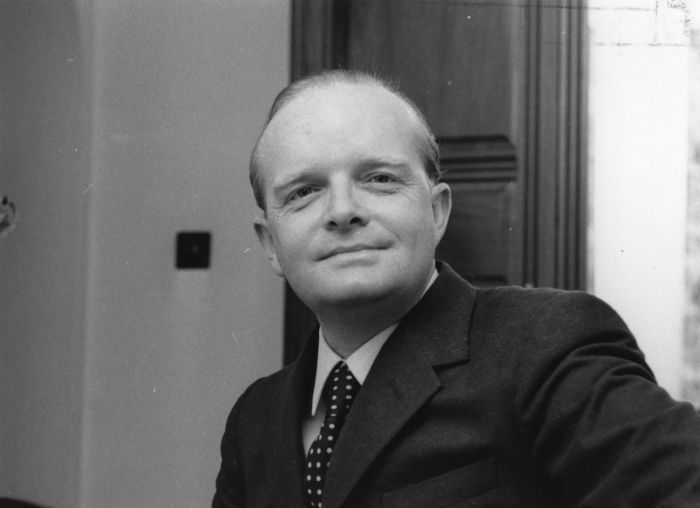Truman Capote, renowned for his literary prowess, drew inspiration from a tapestry of influences that left an indelible mark on his writing. From the haunting prose of Edgar Allan Poe to the Southern Gothic sensibilities of Tennessee Williams, Capote’s work reflects a profound synthesis of literary traditions.
This essay delves into the myriad influences that shaped Capote’s unique writing style, exploring the profound impact of personal experiences, film and theater, and journalistic principles on his literary output. By examining the genesis of his literary influences, we gain a deeper appreciation for the complex and captivating world he created through his words.
Truman Capote’s Literary Influences

Truman Capote’s distinctive writing style was shaped by a diverse range of literary influences. His prose exhibits a blend of Southern Gothic sensibilities, modernist experimentation, and the incisive social commentary of his contemporaries.
Edgar Allan Poe
Capote was deeply drawn to the macabre and the grotesque, which is evident in his early works such as “Miriam” and “Tree of Night.” Edgar Allan Poe’s tales of mystery and the supernatural left a profound mark on Capote’s imagination, influencing his use of atmospheric settings, psychological suspense, and the exploration of the human psyche.
F. Scott Fitzgerald
The lyrical prose and social critique of F. Scott Fitzgerald’s “The Great Gatsby” resonated with Capote’s own aspirations to capture the complexities of American society. Fitzgerald’s ability to portray the fragility and disillusionment of the Jazz Age informed Capote’s writing about the social elite in works like “Breakfast at Tiffany’s” and “In Cold Blood.”
Tennessee Williams
Tennessee Williams’s exploration of dysfunctional relationships and the human condition influenced Capote’s own focus on the inner lives of his characters. Williams’s characters, often trapped in emotional turmoil, mirror Capote’s preoccupation with the psychological complexities of human nature.
The Influence of Southern Gothic Literature
Southern Gothic literature, with its focus on grotesque characters, haunting settings, and themes of decay and isolation, had a profound influence on Truman Capote’s writing.
In Capote’s novel “Other Voices, Other Rooms,” the isolated mansion and its eccentric inhabitants evoke the Southern Gothic atmosphere of mystery and decay. The themes of alienation and loss, common in Southern Gothic literature, are also central to the novel.
Breakfast at Tiffany’s
Even in his more lighthearted works like “Breakfast at Tiffany’s,” Capote incorporates elements of Southern Gothicism. The character of Holly Golightly, with her fragile beauty and mysterious past, embodies the Southern Gothic trope of the enigmatic and alluring woman.
The Role of Personal Experience
Truman Capote’s life was a tumultuous journey that left an indelible mark on his writing. From his impoverished childhood to his flamboyant adult lifestyle, his personal experiences infused his works with a raw authenticity and emotional depth.
Childhood
Capote’s childhood was marked by poverty, neglect, and abuse. His parents’ separation and his mother’s alcoholism left him feeling isolated and unloved. These experiences shaped his understanding of loneliness, abandonment, and the fragility of human relationships.
Relationships
Capote’s relationships were often intense and complex. He formed close friendships with celebrities and socialites, but his emotional needs often led to disappointment and betrayal. His relationship with Perry Smith, the murderer he profiled in In Cold Blood , was particularly profound and influenced his exploration of the human capacity for violence and redemption.
Travels
Capote’s travels exposed him to diverse cultures and perspectives. He spent time in Europe, South America, and the American South, absorbing the sights, sounds, and stories that would later find their way into his writing. His encounters with different social classes and ways of life broadened his understanding of human nature and the complexities of society.
Capote’s Unique Writing Style
Truman Capote’s writing style is a unique blend of Southern Gothic and New Journalism, characterized by its lyrical prose, evocative imagery, and unflinching exploration of the human psyche. His ability to capture the nuances of human emotion and behavior, combined with his mastery of language, sets him apart from his contemporaries.
Use of Language
Capote’s prose is both lyrical and precise, often employing vivid imagery and sensory details to create a rich and immersive experience for the reader. He had a keen ear for dialogue, and his characters’ voices are authentic and distinctive, reflecting the complexities of their inner lives.
Structure
Capote’s works often employ a fragmented and non-linear structure, reflecting the fragmented nature of human experience. He uses flashbacks, stream-of-consciousness, and multiple perspectives to provide a multifaceted and immersive narrative.
Symbolism
Capote’s use of symbolism is subtle and evocative, often relying on recurring motifs and imagery to explore deeper themes and meanings. In “In Cold Blood,” for example, the recurring image of the bird foreshadows the impending violence and the characters’ entrapment.
Comparison to Contemporary Authors
Capote’s writing style differs significantly from that of his contemporary Norman Mailer, who employed a more journalistic and objective approach. Mailer’s writing is characterized by its long, complex sentences and its focus on political and social issues. In contrast, Capote’s prose is more lyrical and subjective, delving into the psychological depths of his characters.
Capote’s style also differs from that of Joan Didion, who is known for her minimalist and detached prose. Didion’s writing is characterized by its sharp observations and its exploration of the complexities of modern life. Capote, on the other hand, employs a more emotional and immersive style, focusing on the inner lives of his characters.
The Influence of Film and Theater
Truman Capote’s experiences in film and theater deeply influenced his writing. His early exposure to these mediums shaped his storytelling techniques and character development, leading to the creation of vivid and dynamic narratives.
Capote’s time as a screenwriter in Hollywood exposed him to the techniques of cinematic storytelling, such as pacing, dialogue, and visual imagery. These elements became integral to his writing, enhancing the suspense and atmosphere of his works.
Film Techniques
- Pacing: Capote’s writing often mimics the rhythmic structure of a film, with alternating scenes of tension and release, creating a sense of urgency and anticipation.
- Dialogue: Capote’s characters speak in a natural and authentic manner, capturing the nuances of human conversation and revealing their inner motivations.
- Visual Imagery: Capote’s descriptions are rich and evocative, painting vivid pictures in the reader’s mind, akin to the visual impact of a film.
Capote’s involvement in theater further enriched his understanding of character development and emotional depth. His observations of actors’ performances taught him the importance of creating complex and believable characters, capable of evoking a wide range of emotions.
Theatrical Influences
- Character Complexity: Capote’s characters are often flawed and multifaceted, exhibiting both strengths and weaknesses, just like the characters in a play.
- Emotional Depth: Capote’s writing explores the depths of human emotions, delving into the motivations and desires that drive his characters’ actions.
- Dialogue-Driven: Capote’s works often rely heavily on dialogue to convey character development and advance the plot, reflecting the importance of dialogue in theater.
The influence of film and theater on Truman Capote’s writing is undeniable. His experiences in these mediums provided him with valuable storytelling tools, allowing him to create captivating and unforgettable works of literature.
The Impact of Journalism

Journalism played a pivotal role in Truman Capote’s writing, particularly in his groundbreaking work “In Cold Blood.” Capote’s meticulous research and journalistic techniques significantly shaped the narrative and themes of the novel.
Journalistic Techniques
Capote employed various journalistic techniques to create a vivid and authentic account of the Clutter family murders. He conducted extensive interviews with the victims’ family, friends, and neighbors, as well as the perpetrators, Perry Smith and Richard Hickock. By immersing himself in the community, Capote gained an intimate understanding of the events and the people involved.
He also used literary devices such as dialogue, scene descriptions, and character analysis to bring the story to life.
Ethical Considerations
Capote’s journalistic approach also raised ethical considerations. His decision to befriend the killers and gain their trust raised questions about the objectivity of his reporting. Some critics argued that Capote’s empathy for Smith and Hickock compromised the novel’s integrity. However, Capote maintained that his personal connection to the perpetrators allowed him to delve deeper into their motivations and provide a more nuanced portrayal of their characters.
Impact on the Narrative
Capote’s journalistic techniques and ethical considerations had a profound impact on the narrative of “In Cold Blood.” The novel’s focus on the victims and the perpetrators allowed Capote to explore the complex themes of violence, guilt, and redemption. By blurring the lines between fiction and journalism, Capote created a work that challenged traditional literary conventions and redefined the boundaries of non-fiction storytelling.
The Legacy of Truman Capote
Truman Capote’s literary legacy continues to inspire and captivate readers worldwide. His groundbreaking works have left an enduring mark on American literature, shaping the landscape of modern writing and popular culture.
Capote’s unique style, characterized by its lyrical prose, intimate storytelling, and profound psychological insights, has influenced countless writers. His ability to delve into the darkest recesses of the human psyche and explore themes of love, loss, and obsession has set a new standard for literary fiction.
The Impact on American Literature
Capote’s influence on American literature is undeniable. His groundbreaking novel, In Cold Blood , revolutionized the true crime genre, blurring the lines between fiction and nonfiction. Capote’s meticulous research and immersive storytelling techniques have become a model for subsequent true crime writers.
Capote’s other works, such as Breakfast at Tiffany’s and Other Voices, Other Rooms , have also had a profound impact on American literature. His exploration of the American South and its complex social dynamics has contributed to a deeper understanding of the region’s culture and history.
The Enduring Appeal in Popular Culture
Capote’s legacy extends beyond the literary world into popular culture. His works have been adapted into numerous films, television shows, and stage productions. The iconic film Breakfast at Tiffany’s , starring Audrey Hepburn, has become a cultural touchstone, embodying the glamour and sophistication of the 1960s.
Capote’s influence is also evident in the realm of fashion and celebrity culture. His close association with high society and his flamboyant personality have made him a subject of fascination for generations. His witty observations and sharp social commentary continue to resonate with audiences today.
Table of Influences
Truman Capote’s writing was shaped by a diverse range of influences, including literary traditions, personal experiences, and cultural movements. This table summarizes the key influences that contributed to his unique literary style.
To fully understand the depth and complexity of Capote’s work, it is essential to delve into the various influences that shaped his writing. This table provides a comprehensive overview of these influences, highlighting their significance and impact on his literary output.
Influence
Southern Gothic Literature
Personal Experience
Film and Theater
Journalism
Description
Gothic elements, grotesque characters, and atmospheric settings
Childhood trauma, relationships, and social observations
Influence of cinematic techniques, theatrical dialogue, and stagecraft
Objective reporting, investigative techniques, and true crime
Examples
“Other Voices, Other Rooms” (Gothic atmosphere)
“In Cold Blood” (based on a true crime)
“Breakfast at Tiffany’s” (theatrical dialogue)
“The Muses Are Heard” (journalistic style)
Timeline of Influences

Truman Capote’s writing was shaped by a complex interplay of influences that evolved throughout his career. The following timeline illustrates the progression of these influences, highlighting milestones and key works that reflect their impact.
Capote’s early childhood in the Deep South left an enduring mark on his writing, infusing it with the themes and imagery of Southern Gothic literature. His experiences in New York City during the 1940s and 1950s exposed him to the world of high society and celebrity, which became the subject of his later works.
Southern Gothic Literature
- Childhood in Alabama and Mississippi (1924-1932)
- Early stories and novellas set in the American South (1943-1948)
Personal Experience
- Turbulent childhood and adolescence
- Relationship with Harper Lee and other writers
Journalism
- Worked as a journalist for The New Yorker (1948-1955)
- In Cold Blood (1966): a groundbreaking work of “New Journalism”
Film and Theater
- Interest in film and theater from a young age
- Screenplays and adaptations of his works
Legacy of Truman Capote
Truman Capote’s unique writing style and groundbreaking works have left an enduring legacy in American literature. His influence continues to be felt by contemporary writers and readers alike.
Annotated Bibliography
The following annotated bibliography provides a comprehensive overview of critical works that have analyzed Truman Capote’s literary influences.
The Cambridge Companion to Truman Capote
Edited by Kevin M. Quashi, this volume offers a multifaceted examination of Capote’s influences, including his Southern Gothic roots, his fascination with the grotesque, and his use of journalism as a literary form.
Truman Capote’s In Cold Blood: A Critical Casebook
Edited by John Bloom and Leslie A. Fielder, this collection of essays explores the genesis and impact of Capote’s seminal work, examining its influence on the development of the true-crime genre.
The Art of Fact: Truman Capote’s “In Cold Blood”
By Gerald Clarke, this in-depth study provides a detailed account of Capote’s writing process, highlighting his meticulous research and his innovative use of narrative techniques.
Capote: A Biography
By Gerald Clarke, this comprehensive biography offers a detailed examination of Capote’s life and work, exploring the personal experiences and literary influences that shaped his writing.
Truman Capote: Conversations
Edited by M. Thomas Inge, this collection of interviews with Capote provides insights into his own thoughts on his influences, his writing process, and his literary legacy.
Summary
Truman Capote’s legacy as a literary icon endures, his influence continuing to resonate in the works of contemporary writers. His ability to transcend genres and fuse diverse influences into a cohesive and compelling style remains a testament to his artistry.
Capote’s literary contributions stand as a timeless reminder of the transformative power of imagination and the enduring influence of the human experience on the written word.
FAQ
How did Truman Capote’s childhood experiences shape his writing?
Capote’s tumultuous childhood, marked by abandonment and instability, profoundly influenced his writing. His themes of loneliness, alienation, and the search for belonging often mirrored his own experiences, lending a raw authenticity to his characters and narratives.
What was the significance of Southern Gothic literature in Capote’s work?
Southern Gothic literature, with its focus on the grotesque, the macabre, and the decay of the Old South, deeply influenced Capote’s writing. His works, such as “Other Voices, Other Rooms” and “Breakfast at Tiffany’s,” exhibit the influence of this genre, capturing the haunting atmosphere and complex characters that define Southern Gothicism.
How did journalism impact Capote’s writing, particularly in “In Cold Blood”?
Capote’s experience as a journalist, especially his work on “In Cold Blood,” significantly influenced his writing style. He employed journalistic techniques, such as meticulous research and interviews, to create a hybrid form of fiction and nonfiction, blurring the boundaries between the two genres and revolutionizing the literary landscape.

